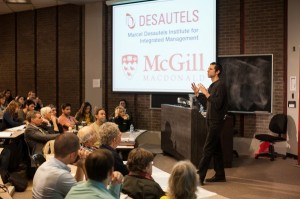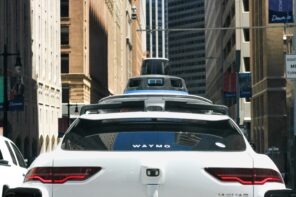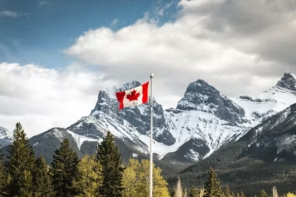On Thursday, the Marcel Desautels Institute for Integrated Management and the Faculty of Agriculture and Environmental Science welcomed Charles Eisenstein for a discussion regarding his book “Sacred Economics– Money, Gift & and Society in the Age of Transition.” The presentation included a Q&A session, which was followed by a cocktail reception.
Eisentein’s book details economic, social, and spiritual reasons for the current economic and environmental crisis. He offers and details a solution through the means of returning to, what he has coined, a “gift economy.”
Anita Novak, Integrating Director of Desautels’ Social Economy Initiative, welcomed the audience to the presentation and invited student Mike Lepperd to introduce Charles Eisenstein.
Eisenstein opened with a disclaimer, professing that he is not an economist, but rather someone who writes from outside the confines of the field. Although there are some advantages from said outside perspective, Eisenstein forewarns that there may be gaps in his logic.
Eisenstein began his talk by defining money. He describes the superficiality of money as a “magic,” where one can “manipulate symbols to change reality.” He suggested that humans have become slaves to this magic, thus making it no longer effective. Many people who set out to work in the service sector– such as those trying to preserve wetlands or foster new sustainability practices– find it terribly difficult to make money from these professions. “Money is the enemy of what is sacred,” states Eisenstein. He continued by claiming that money and capital have become the root of such problems like climate change and deforestation.
The obsession with money, according to Eisenstein, has converted our economy from a “gift economy” to a “money economy.” He described a “gift economy” as one centralized on community, where people depend on the direct exchange of goods and services. In the “money economy,” however, everything from food to childcare is purchased outside of the home and community. Eisenstein argues that the growth of the “money economy” makes us completely independent of one another, leaving us isolated and unhappy.
Eisenstein argues that the “money economy” encourages the transformation of relationships into services and nature into products. This, he says, is not a problem as long as you can continue to grow the economy with new products and new services. However, it is becoming increasingly difficult to find nature that can still be converted into product. Politicians want to re-stimulate the economy by encouraging more growth and consumption, but Eisenstein believes we have reached the end of the line.
The “money economy,” as described by Eisenstein, is based on both a story of self and a story of humans. It is grounded in stories that describe who we are as individuals and as a collective. Presently, the story of self dictates that each one of us is “a discrete separate individual among other individuals.” Similarly, the story of humans is one not of interdependency, but one that sees us as the “Lords and possessors of nature.” According to this story, we are separate and superior to nature and all other living creatures.
Recently we have seen these stories begin to disintegrate. As the destruction of the environment becomes a more prominent concern, large movements are pushing for environmentally friendly practices and alternatives for fuel. Unfortunately, as Eisenstein mentioned at the start of the discussion, there is little financial gain in the “sacred” service sector.
So how do we fix it? The first step is to change our story of the self and of humans to align with our new ideals. As long as humans continue to deny that the old story no linger fits, the economy and environment will continue to collapse. Eisenstein’s new story of self is of the “connected self: not just that we depend on each other, but that we are each other.” Similarly, the story of humans is one of “inter-being.” According to this story we are deeply connected to nature. Therefore, the destruction of the environment also means the destruction of humans. The new story of humans justifies the need to repair the damaged environment. When this need is recognized, jobs in the service sector will no longer be thought of as less important.
To end his talk, Eisenstein drew a parallel between our society and a child reaching maturity. He describes how we took all that we could from our Mother Earth, and now that we have reached our peak growth, we are ready to give back. He compared environmental destruction and economic downturn to a kind of coming-of-age ordeal— one that will cause us to change the way we think about our relationship to the Earth, and hopefully push humanity into a stage of maturity.








